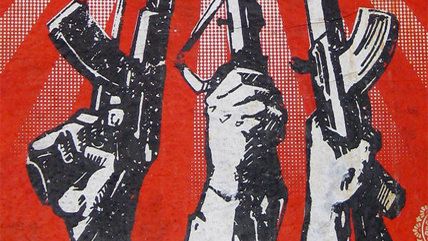Ukrainians and Venezuelans Need Guns To Be Free
The U.S. isn't coming to the rescue, so they had better be able to defend themselves.

It's hard to stand by and watch the plight of Ukraine and Venezuela, but the U.S. can do little to positively impact either situation. The thing is, they don't need us. What they do need is a way to exercise their basic property rights and protect themselves. That is, they need guns, and could have used them to prevent their current crises.
The Cato Institute's Andrey Illarionov suggested in interview this week that Ukraine is trying to be "free and independent." In order to achieve this in the face of a Russian invasion, it must have a "complete arming of the people." He argues that "mankind has never come up with something better" than "unobstructed gun ownership" to ensure "that a free man shall not become a slave."
The argument that an armed society is a polite society isn't just folk wisdom. A 2013 analysis of the U.S. and Europe published in the Harvard Journal of Law & Public Policy recognized that "nations with stringent gun controls tend to have much higher murder rates than nations that allow guns, and that "nations which have violence problems tend to adopt severe gun controls, but these do not reduce violence, which is determined by basic socio-cultural and economic factors."
A 2008 study by The Independent Institute's David Kopel looked at 59 countries, and "the data show[ed]… nations with the highest rates of gun ownership tend to have greater political and civil freedom, greater economic freedom and prosperity, and much less corruption than other nation."
Venezuela–where people are pushing back against notoriously high murder rates, waning freedom, and an anemic economy–predictably and unfortunately falls on the wrong side of this gun debate. Subtracting the stratospheric number of homicides and adding a foreign invasion, Ukraine also has a very bad situation.
Protests began in Venezuela as a peaceful response to corrupt and dangerous conditions. Twenty-nine people are now dead and hundreds have been injured. The military, other arms of the government, and pro-government paramilitary groups have been firing on the opposition, which is armed mostly with rocks.
This disparity exists in part because Hugo Chavez banned private ownership of firearms in 2012, asserting that it was the root of Venezuela's crime problem.
The prohibition secured the regime's place as a major distributor of violence and rendered law-abiding individuals more vulnerable than ever. The Small Arms Survey highlights the fact that "the Venezuelan military and security services serve as important sources of illegal firearms," and according to the Venezuelan Observatory on Violence, police slay "thousands" of people each year. The fact that National Guard felt compelled to seize a toilet paper factory last year would almost be funny if it weren't a glaring sign that the country is dangerous for anyone who isn't in with the ruling party.
The country saw nearly 25,000 homicides in 2013, up from 21,600 in 2012. Venezuelans feel defenseless in the face of such high crimes. Both the rising murder rates and subsequent frustration, which helped spark protests, could have been avoided if Chavez had never disarmed his people.
Ukraine has restrictive laws of its own, which leave only 6.6 per 100 citizens in legal possession of firearms.
When nonviolent protests against corruption began late last year, the nation's now-deposed leader responded by further restricting rights and brutalizing people. In February, government forces started using live rounds on demonstrators, who had some guns of their own but mostly wielded makeshift weapons. The government killed around 100 people and injured well over 1,000.
Violence has not been the preferred tactic of the protesters in either country and that would be no different if they were able to defend themselves with non-primitive weapons. What would have changed, however, is government tactics. They could have avoided much bloodshed and "the worst violations of human rights in 15 years," as NPR describes the situation in Venezuela, if government forces and their allies saw their countrymen as equals (in fire power, if nothing else) instead of easy targets. This worked to some extent in Ukraine: shortly after civilians seized a government armory, many police officers stopped fighting them and started defending them.
Now that Russia has annexed one region of Ukraine and still poses a threat to other areas of the country, the argument for gun rights only becomes stronger. Ukraine's new opposition-led government cannot effectively protect its remaining citizens, because the military is in disarray. And although people are joining the newly formed national guard so they can get their hands on some arms for protection, that just is not enough to guarantee everyone's safety.
It is immoral to deny people the ability to take up the best tools of self-defense. Banning and restricting guns has put Venezuela and Ukraine in bad positions. Venezuela's regime obviously has no desire to cede power to the people it has been harming, but if the opposition succeeds, hopefully it will prioritize reversing the nation's ruinous gun policies. Ukraine is in a different position, and the people now have representative leadership. For the sake of itself and its constituents, that government must recognize the right to bear arms is imperative, as Illarionov contends, to ensuring that the country remains free.


Show Comments (103)